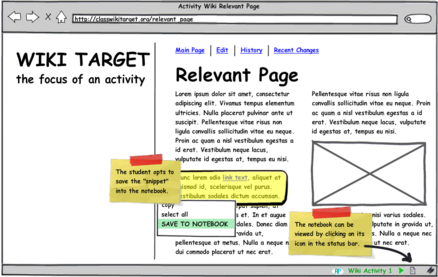Jetpack for Learning: Reflecting Pool
The internet is a potentially powerful tool for enhancing learning environments. However, the unstructured nature of it can present a challenge to both students and teachers. For example, students may lack the ability to pursue a learning goal strategically and therefore find themselves overwhelmed by the amount of information at their fingertips and wandering aimlessly. Teachers, on the other hand, may be at a loss of how to assess students' learning in such a setting and unable to understand the connections that students' are making.
 Reflecting Pool Mockup Screenshot
Reflecting Pool Mockup Screenshot
Reflecting Pool (see attached interactive PDF) aims to improve internet-based activities for students by increasing metacognitive awareness (i.e., planning, monitoring, and control of thinking) and for teachers by giving them greater access to the thought processes of their students. Furthermore, it offers a unique opportunity for all to understand and explore the collective knowledge of the class.
At its most basic level, a teacher plans an activity around a particular website. Students are asked to respond to several questions that help them develop a specific learning goal. As they explore the website, they are able to highlight relevant pieces of information, which are then added to their virtual notebook. By reviewing the notebook, the student is able to monitor their progress toward the initial planned goal. Once this goal has been reached, the student then responds to additional reflective prompts, which help the student assess their knowledge and plan for future learning. More advanced modules could easily be developed that would allow for students to explore websites of their own choosing. In this case, the source of information could become another layer of information for the student to track and discuss.
A major advantage of this type of tool would be that the teacher has a wealth of information at his or her fingertips. The teacher is better able to understand what elements pique students' curiosity, possible misconceptions that need clarification, the learning goals that students pursue in unstructured settings, and what they take away from these types of experiences. It is likely that certain clusters will form (e.g., similar goals or highlighted information)—an aspect of the Reflecting Pool that can aid teachers in follow-up discussion. Thus, the teacher will be more able to understand the thinking of individual students and across their entire class.
Reflecting Pool has the potential to capture a lot of information—data that can be visualized in a way that makes the knowledge constructed across the classroom more readily apparent. For example, the student or teacher could explore the initial learning goals, subsequent highlighted text, or final learning outcomes through an interactive concept map.
The mockup can be navigated page by page like a regular PDF or by clicking on the relevant interface regions.
| Attachment | Size |
|---|---|
| reflection_pool_mockup.pdf | 1.28 MB |
- Mike's blog



- 20378 reads
tags
Copyright Mike Edwards 2006-2009. All content available under the Creative Commons Attribution ShareAlike license, unless otherwise noted.
